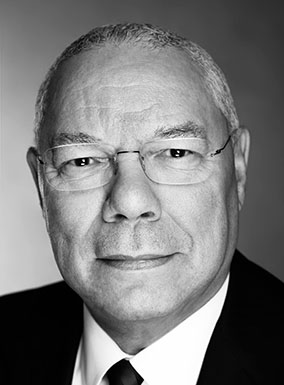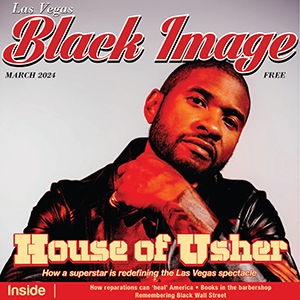Excellence Personified
November 6, 2021 by agutting@reviewjournal.com
Filed under Cover Story, Feature
The passing of Colin Powell reminds us why role models are so powerful in our lives.

There was a day when role models were not very difficult to find in the world at large. While these examples remain in abundance within our families and communities, there is a growing sense that the values of character, dignity, and honesty are waning in our broader public discourse.
Those qualities defined the life and work of Gen. Colin Powell, who died Oct. 18 at the age of 84. With intelligence and grace, he spent his life working to bring clarity where there was confusion, and understanding where there is conflict.
One of the most accomplished leaders of his generation, Powell was the youngest Chair of the Joint Chiefs of Staff; and when the second Bush administration emerged from the controversial 2000 election, the new president chose Powell as secretary of state, the first African-American to serve as the nation’s top diplomat..
Born Colin Luther Powell on April 5, 1937, in Harlem, New York, Powell was the son of Jamaican immigrants Luther and Maud Powell. He was raised in the South Bronx and educated in the New York City public schools, graduating from Morris High School in 1954 without any definite plans for where he wanted to go in life. It was at City College of New York, where Powell studied geology, that he found his calling — in the Reserve Officers Training Corps (ROTC). He soon became commander of his unit. This experience set him on a military career and gave him structure and direction in his life.
After graduating in 1958, Powell was commissioned as a second lieutenant in the U.S. Army. While stationed at Fort Devens, Massachusetts, Colin Powell met Alma Vivian Johnson of Birmingham Alabama, and they married in 1962. The couple has three children: son Michael, and daughters Linda and Annemarie.
In 1962, he was one of 16,000 advisers sent to South Vietnam by President John F. Kennedy. In 1963, Powell was wounded by a punji-stick booby trap while patrolling the Vietnamese-Laotian border. During this first tour of duty, he was awarded a Purple Heart and, a year later, a Bronze Star. While on the second Vietnam tour of duty in 1968-69, Powell was injured in a helicopter crash. Despite his injury, he managed to rescue his comrades from the burning helicopter, for which he was awarded the Soldier’s Medal. In all, Powell has received 11 military decorations, including the Legion of Merit.
Powell earned an MBA at George Washington University, in Washington, D.C., and won a White House Fellowship in 1972. He worked in both the Nixon and Reagan administrations. In the Carter administration, Powell was an assistant to the deputy secretary of defense and the secretary of energy.
General Powell had a very successful diplomatic career after the Sept. 11 terrorist attacks on New York and Washington in 2001. General Powell was a man of integrity and according to President Biden on a recent town hall on CNN, “He would also admit it when he made a mistake. He had compassion.”
Powell retired from government service in 2006, but stayed vocal on political issues and made headlines when he announced his endorsement of Barack Obama for President of the United States.
Powell also spent much of his retirement in the business community. In 2006, he was a speaker at a special series called, “Get Motivated.” He spent much of his life inspiring many with his leadership skills and life experiences. Along with his wife, Powell began America’s Promise Alliance — as part of their dedication to the wellbeing of children and youth at all socioeconomic levels and their commitment to seeing that young people receive the resources necessary to succeed.
Even though there has been debate over Powell’s relationship with the Black community, it must be noted that his accomplishments as a Black man in America were extraordinary. He set a high bar of excellence and set an example for leveling the playing field by working hard and taking a seat at the table at the highest levels of international and military affairs. In doing so, he obliterated stereotypes and set a path for many to follow.
After endorsing Obama, Powell became progressively disenchanted with the GOP and called then-President Donald Trump a national disgrace — then further distanced himself from the Republican Party following the January 6 insurrection on Capitol Hill.
Powell’s legacy will live on through the ages. And so will his words, a selection of which we are offering below for more wisdom and inspiration from a great man.
On racial bigotry
“Racism is a disease that you can help cure by standing up for your rights, and by your commitment to excellence and to performance, by being ready to take advantage of your rights and the opportunities that will come from those rights.”
From his 1994 commencement speech at Howard University
“Leadership is solving problems. The day soldiers stop bringing you their problems is the day you have stopped leading them.”
General Powell’s Thirteen Rules (originally published in Parade Magazine)
1. It ain’t as bad as you think. It will look better in the morning.
2. Get mad, then get over it.
3. Avoid having your ego so close to your position that when your position falls, your ego goes with it.
4. It can be done.
5. Be careful what you choose: You may get it.
6. Don’t let adverse facts stand in the way of a good decision.
7. You can’t make someone else’s choices. You shouldn’t let someone else make yours.
8. Check small things.
9. Share credit.
10. Remain calm. Be kind.
11. Have a vision. Be demanding.
12. Don’t take counsel of your fears or naysayers.
13. Perpetual optimism is a force multiplier.






